(完整版)动词过去式变化及练习题
- 格式:doc
- 大小:52.51 KB
- 文档页数:3
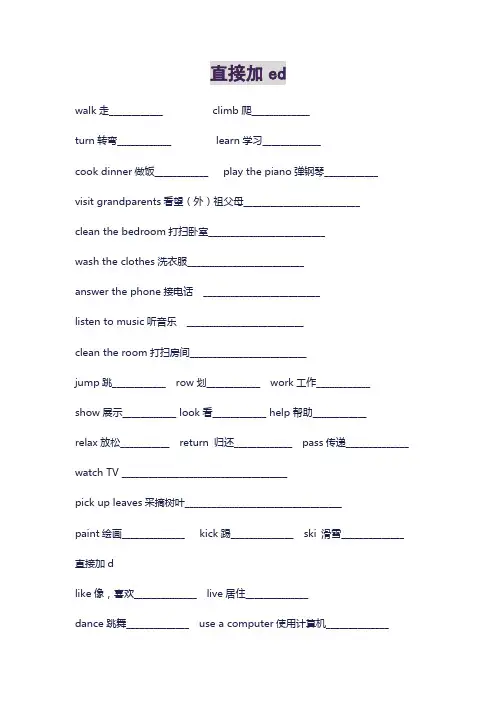
直接加edwalk走____________ climb爬_____________turn转弯____________ learn学习_____________cook dinner做饭____________ play the piano弹钢琴____________visit grandparents看望(外)祖父母__________________________clean the bedroom打扫卧室__________________________wash the clothes洗衣服__________________________answer the phone接电话__________________________listen to music听音乐__________________________clean the room打扫房间__________________________jump跳____________ row划____________ work工作____________show展示____________ look看____________ help帮助____________relax放松___________ return 归还_____________ pass传递______________ watch TV _____________________________________pick up leaves采摘树叶___________________________________paint绘画______________ kick踢______________ ski 滑雪______________ 直接加dlike像,喜欢______________ live居住______________dance跳舞______________ use a computer使用计算机______________love爱______________ taste尝______________close关上______________ prepare准备_____________不规则变化eat吃____________ have有;吃____________ buy买____________ take买;带____________ go去____________ sing唱歌____________ teach(taught)教run(ran)跑fight(fought)打架get up起床____________ swim游泳____________ fly飞____________ swing(swung)荡sleep(slept)睡觉sweep(swept) the floor扫地do做____________ make the bed铺床____________draw(drew) pictures画画write(wrote) a letter写信catch(caught)butterflies捉蝴蝶meet(met)见面drink(drank)喝tell(told)告诉ride(rode)骑find(found)寻找到drive(drove)驾驶come(came)来become(became)变成feel(felt)感觉到think(thought)思考meet(met)遇见fall(fell)落下leave离开_____________ wake(woke) up醒来bring带来____________ is___________ am___________ are____________ see看到_________ grow种植grew stand(stood)站立词形不变read books读书__________________ put放__________________set the table摆饭桌__________________ hit (hit)撞击、打cut 切、割_______ 最后一个字母双写再加edstop(stopped)停shop购物__________________把y变成i再加edempty the trash倒垃圾__________________一、单项选择( ) 1. The girl ____a red sweater is ______duty today.A. in, onB. in, inC. on, inD. on, on( ) 2. It’s very cold, _____your coat, please, Kate.A. put offB. put onC. puts onD. put in( ) 3. —— What day is today?—— It's ______.A. MondayB. a fine dayC. September 1stD. weekday ( ) 4. Shall we ______home?A. goB. goingC. goesD. went( ) 5. How much is the hot dog?A. TwoB. Three dollarsC. Four hot dogsD. Very much( ) 6. Whose book is it? It’s not ___ book, It’s ____A. my ,herB. mine ,hersC. My , hersD.mine,she二、阅读下面短文,选出最佳选项,将其序号填入提前括号内。
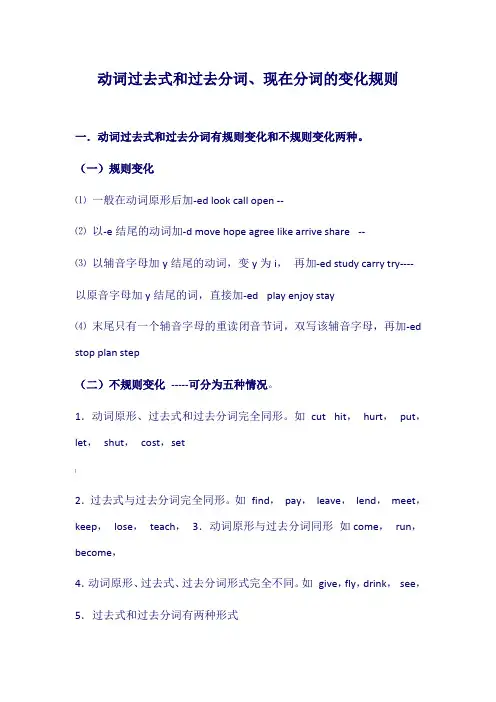
动词过去式和过去分词、现在分词的变化规则一.动词过去式和过去分词有规则变化和不规则变化两种。
(一)规则变化⑴一般在动词原形后加-ed look call open --⑵以-e结尾的动词加-d move hope agree like arrive share --⑶以辅音字母加y结尾的动词,变y为i,再加-ed study carry try----以原音字母加y结尾的词,直接加-ed play enjoy stay⑷末尾只有一个辅音字母的重读闭音节词,双写该辅音字母,再加-ed stop plan step(二)不规则变化-----可分为五种情况。
1.动词原形、过去式和过去分词完全同形。
如cut hit,hurt,put,let,shut,cost,set}2.过去式与过去分词完全同形。
如find,pay,leave,lend,meet,keep,lose,teach,3.动词原形与过去分词同形如come,run,become,4.动词原形、过去式、过去分词形式完全不同。
如give,fly,drink,see,5.过去式和过去分词有两种形式burn,burned burnt burned burnt learn learned learnt learned learntSmell smelled smelt smelled smeltlie有规则变化和不规则变化两种,lie lied, lied(说谎) lie lay, lain(躺,位于)hang 有规则变化和不规则变化两种hang hanged, hanged(处绞刑) hang hung, hung(挂,吊)二、过去式和过去分词及发音1. ed在清辅音音素后发音为〔t〕,2. 在浊辅音后发音为〔d〕,在元音后发音也为[d]3. -ed在〔t]、〔d〕后发音为[id]三、现在分词的变化规则1 一般在动词原形词尾加-ing,play carry go playing carrying going)2.以不发音的e结尾的动词,先去掉e,再加-ing take write leave taking writing leaving3.重读闭音节结尾的动词,如果词尾只有一个辅音字母,要将该末尾只有一个辅音字母的重读闭音节词,双写该辅音字母,再加-ing stop fit begin forget cutting stopping fitting beginning forgetting4.以ie结尾的动词,要把ie改为y,再加-ing lie die tie lying[dying tying 练习:写出下列动词的过去式和现在分词push move cross spend finishrain travel arrive cut putshut go have come hurtmind visit notice pay playtry smile turn share listencount hear cry carry stop"copy meet move study staytake make stand bring buyfight light think hold sittell cut set hit meetbe kick look do eatlike knock open see pullshow wash try give havehurry wake count post play%。
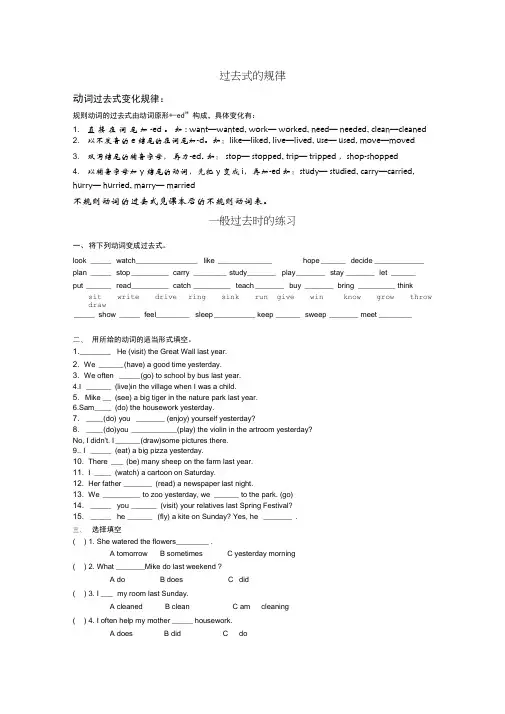
过去式的规律动词过去式变化规律:规则动词的过去式由动词原形+-ed”构成,具体变化有:1. 直接在词尾加 -ed 。
如 : want—wanted, work— worked, need— needed, clean—cleaned2. 以不发音的 e结尾的在词尾加-d。
如:like—liked, live—lived, use— used, move—moved3. 双写结尾的辅音字母,再力-ed. 如: stop— stopped, trip— tripped ,shop-shopped4. 以辅音字母加y结尾的动词,先把y变成i,再加-ed如:study— studied, carry—carried, hurry— hurried, marry— married不规则动词的过去式见课本后的不规则动词表。
一般过去时的练习一、将下列动词变成过去式。
look _____ watch _______________ like _____________ hope ______ decide ____________ plan _____ stop _________ carry ________ study_______ play _______ stay _______ let ______put ______ read _________ catch _________ teach _______ buy _______ bring _________ think sit write drive ring sink run give win know grow throw draw_____ show _____ feel ________ sleep __________ keep ______ sweep _______ meet ________二、用所给的动词的适当形式填空。
1. _______ He (visit) the Great Wall last year.2. We ______ (have) a good time yesterday.3. We often _____ (go) to school by bus last year.4.I ______ (live)in the village when I was a child.5. Mike __ (see) a big tiger in the nature park last year.6.Sam ____ (do) the housework yesterday.7. ____ (do) you _______ (enjoy) yourself yesterday?8. ____ (do)you ___________ (play) the violin in the artroom yesterday?No, I didn't. I ______ (draw)some pictures there.9.. I _____ (eat) a big pizza yesterday.10. There ___ (be) many sheep on the farm last year.11. I ____ (watch) a cartoon on Saturday.12. Her father _______ (read) a newspaper last night.13. We _________ to zoo yesterday, we ______ to the park. (go)14. _____ you ______ (visit) your relatives last Spring Festival?15. _____ he ______ (fly) a kite on Sunday? Yes, he _______ .三、选择填空( ) 1. She watered the flowers________ .A tomorrowB sometimesC yesterday morning( ) 2. What _______Mike do last weekend ?A doB doesC did( ) 3. I ___ my room last Sunday.A cleanedB cleanC am cleaning( ) 4. I often help my mother _____ housework.A doesB didC do( ) 5. _____ you_____ TV last night ?A Do, watchB Did, watchC Did, watched( ) 6.---Did your dad write an yesterday ?A Yes, he did.B Yes, he does( ) 7.They______on a trip in February ,2007.A are goingB goingC went( ) 8. _______he football two days ago?A Does , playB Did , playedC Did , play( ) 9.-Good afternoon, Miss Lee. How does Mike feel?-He's tired . He ___ a lot of work .A does , this morningB did , this morning♦过去时的否定句1)一般动词过去时若要变成否定句,只需要在动词前面加:主语+()+原形动词陈述句:She________(watch) TV last night.否定句:She ______________(not watch)TV last night.2) be动词的否定句在 was或者were后面加上:陈述句:He ______(is)at home last night.否定句:He ___________(is not) at home last night.♦过去时的疑问句(1) 一般动词的疑问句陈述句:Mary walked to school yesterday.一般疑问句:回答:(2)be动词的疑问句陈述句:The movie was interesting.一般疑问句:回答:完形填空完形填空根据上下文,选择适当的单词填空。
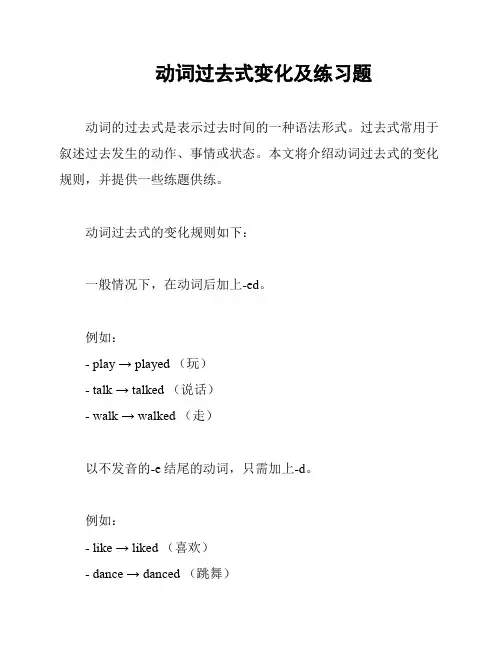
动词过去式变化及练习题动词的过去式是表示过去时间的一种语法形式。
过去式常用于叙述过去发生的动作、事情或状态。
本文将介绍动词过去式的变化规则,并提供一些练题供练。
动词过去式的变化规则如下:一般情况下,在动词后加上-ed。
例如:- play → played (玩)- talk → talked (说话)- walk → walked (走)以不发音的-e结尾的动词,只需加上-d。
例如:- like → liked (喜欢)- dance → danced (跳舞)- close → closed (关闭)以重读闭音节结尾的动词,且末尾只有一个辅音字母,则双写这个辅音字母后再加-ed。
例如:- stop → stopped (停止)- plan → planned (计划)- prefer → preferred (更喜欢)以下是一些练题供练动词过去式的变化:1. He ________ (watch) a movie last night.2. I ________ (study) English for two hours yesterday.3. She ________ (cook) dinner yesterday evening.4. They ________ (visit) their grandparents last weekend.5. We ________ (play) soccer in the park yesterday.参考答案:1. watched2. studied3. cooked4. visited5. played希望本文能帮助你掌握动词过去式的变化规则,加强对过去时态的理解。
练题可以帮助你巩固所学知识,提高动词过去式的运用能力。
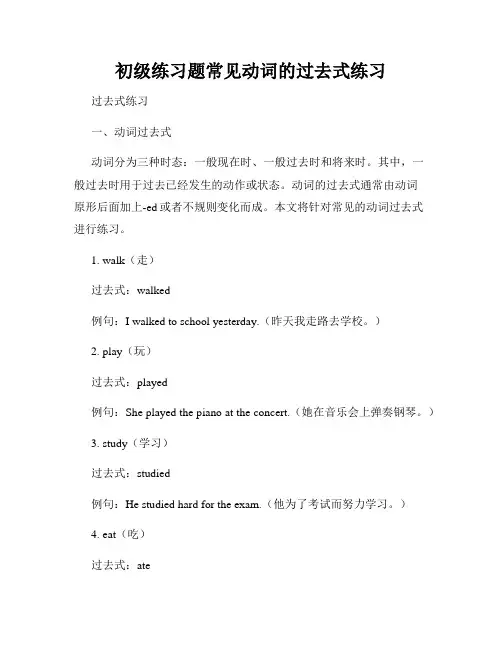
初级练习题常见动词的过去式练习过去式练习一、动词过去式动词分为三种时态:一般现在时、一般过去时和将来时。
其中,一般过去时用于过去已经发生的动作或状态。
动词的过去式通常由动词原形后面加上-ed或者不规则变化而成。
本文将针对常见的动词过去式进行练习。
1. walk(走)过去式:walked例句:I walked to school yesterday.(昨天我走路去学校。
)2. play(玩)过去式:played例句:She played the piano at the concert.(她在音乐会上弹奏钢琴。
)3. study(学习)过去式:studied例句:He studied hard for the exam.(他为了考试而努力学习。
)4. eat(吃)过去式:ate例句:They ate dinner together last night.(他们昨晚一起吃晚餐。
)5. run(跑)过去式:ran例句:He ran fast and won the race.(他跑得很快,并赢得了比赛。
)6. write(写)过去式:wrote例句:She wrote a letter to her friend.(她给她的朋友写了一封信。
)7. sleep(睡觉)过去式:slept例句:I slept well last night.(昨晚我睡得很好。
)8. drink(喝)过去式:drank例句:They drank orange juice at the party.(他们在派对上喝橙汁。
)9. swim(游泳)过去式:swam例句:We swam in the pool yesterday.(我们昨天在游泳池里游泳。
)10. speak(说话)过去式:spoke例句:He spoke English fluently.(他流利地说英语。
)二、练习题根据句子的要求,填入适当的动词过去式。
1. Last night, they __________ (watch) a movie together.2. She __________ (visit) her grandparents last summer.3. We __________ (play) soccer in the park yesterday.4. He __________ (clean) his room this morning.5. Mary __________ (dance) at the party last night.6. They __________ (buy) a new car last week.7. I __________ (visit) my friend in the hospital yesterday.8. He __________ (study) French for three years.9. We __________ (travel) to Beijing last month.10. The children __________ (paint) pictures in art class yesterday.三、答案解析1. watched2. visited3. played4. cleaned5. danced6. bought7. visited8. studied9. traveled10. painted四、总结通过上述练习,我们巩固了常见动词的过去式变化规则。
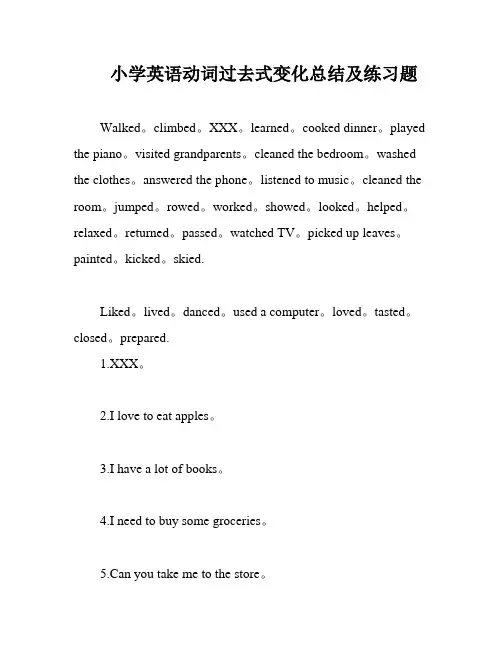
小学英语动词过去式变化总结及练习题Walked。
climbed。
XXX。
learned。
cooked dinner。
played the piano。
visited grandparents。
cleaned the bedroom。
washed the clothes。
answered the phone。
listened to music。
cleaned the room。
jumped。
rowed。
worked。
showed。
looked。
helped。
relaxed。
returned。
passed。
watched TV。
picked up leaves。
painted。
kicked。
skied.Liked。
lived。
danced。
used a computer。
loved。
tasted。
closed。
prepared.1.XXX。
2.I love to eat apples。
3.I have a lot of books。
4.I need to buy some groceries。
5.Can you take me to the store。
6.Let's go XXX7.I XXX English in China for a year。
8.I ran a marathon last weekend。
9.XXX10.I usually get up at 7am。
11.I XXX。
12.Birds can fly in the sky。
13.Let'XXX14.I slept for 10 hours last night。
15.XXX。
16.I need to do my homework。
17.Can you help me make the bed。
18.I drew a picture of a cat。
19.I XXX。
20.XXX21.XXX。
22.XXX。
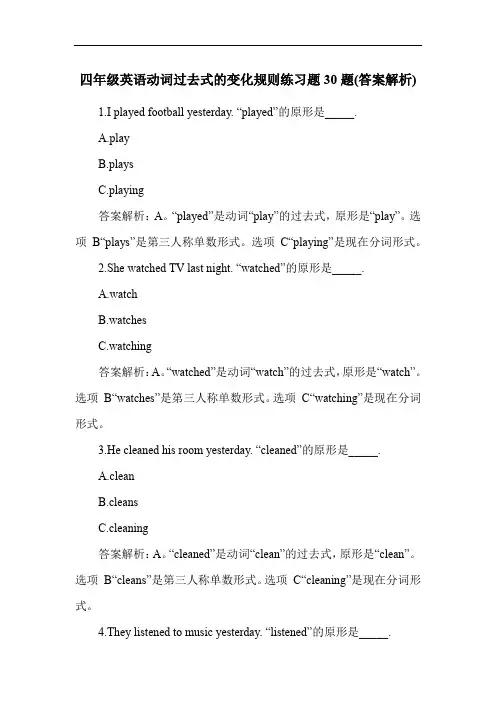
四年级英语动词过去式的变化规则练习题30题(答案解析)1.I played football yesterday. “played”的原形是_____.A.playB.playsC.playing答案解析:A。
“played”是动词“play”的过去式,原形是“play”。
选项B“plays”是第三人称单数形式。
选项C“playing”是现在分词形式。
2.She watched TV last night. “watched”的原形是_____.A.watchB.watchesC.watching答案解析:A。
“watched”是动词“watch”的过去式,原形是“watch”。
选项B“watches”是第三人称单数形式。
选项C“watching”是现在分词形式。
3.He cleaned his room yesterday. “cleaned”的原形是_____.A.cleanB.cleansC.cleaning答案解析:A。
“cleaned”是动词“clean”的过去式,原形是“clean”。
选项B“cleans”是第三人称单数形式。
选项C“cleaning”是现在分词形式。
4.They listened to music yesterday. “listened”的原形是_____.A.listenB.listensC.listening答案解析:A。
“listened”是动词“listen”的过去式,原形是“listen”。
选项B“listens”是第三人称单数形式。
选项C“listening”是现在分词形式。
5.We visited our grandparents last weekend. “visited”的原形是_____.A.visitB.visitsC.visiting答案解析:A。
“visited”是动词“visit”的过去式,原形是“visit”。
选项B“visits”是第三人称单数形式。
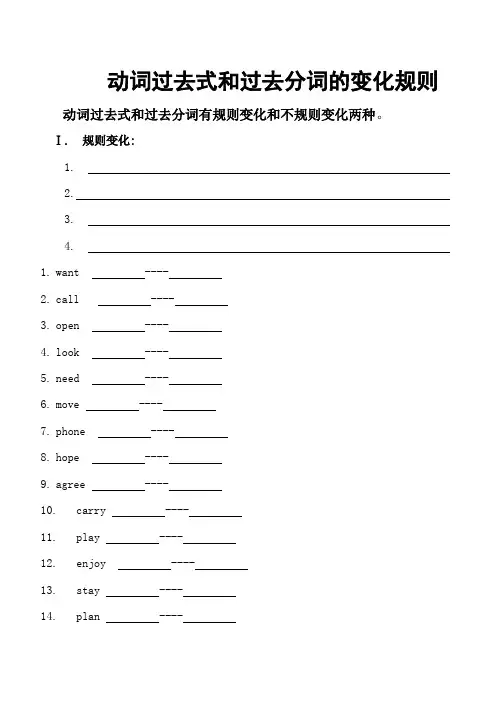
动词过去式和过去分词的变化规则动词过去式和过去分词有规则变化和不规则变化两种。
Ⅰ. 规则变化:1.2.3.4.1.want ----2.call ----3.open ----4.look ----5.need ----6.move ----7.phone ----8.hope ----9.agree ----10.carry ----11.play ----12.enjoy ----13.stay ----14.plan ----15.fit ----16.refer ----II. 不规则动词表:(1) AAA型(动词原形、过去式、过去分词同形)cost(花费) ----cut(割) ----hit(打) ----let(让) ----shut ----spit ----hurt 伤害) ----put(放) ----read (读) ----(2) AAB型(动词原形与过去式同形)beat(跳动) ----(3) ABA型(动词原形与过去分词同形)become(变成) ---- come(来) ----run(跑) ----(4) ABB型(过去式与过去分词同形)dig(挖) ---- get(得到) ----catch ---- hang(吊死 ---- deal ----hang(悬挂) ---- feed ---- hold(抓住) ---- find ---- shine(照耀) ---- forbid ----sit(坐) ---- pay ----win (赢) ---- send ---- meet(遇见) ---- shoot ---- keep (保持) ---- sleep(睡) ---- sweep(扫) ---- feel(感觉) ---- smell(闻) ---- leave(离开) ---- build(建设) ----lend(借出) ---- send (传送) ---- spend(花费) ---- lose (丢失) ---- burn (燃烧) ---- learn(学习) ---- mean(意思是) ---- catch(抓住) ---- teach(教) ---- bring(带来) ---- fight (战斗) ---- buy(买) ----think(想) ----hear (听见) ----sell(卖) ---- tell(告诉) ----say(说) ---- find(找到) ---- have/has(有) ---- make(制造) ---- stand(站) ---- understand明白 ----(5) ABC型(动词原形、过去式与过去分词三者不同形)begin(开始) ---- take(取) ----drink(喝) ---- mistake(弄错) ---- ring(铃响) ----ride(骑) ----sing (唱) ---- do(做) ----swim(游泳) ---- write(写) ----blow(吹) ----go(去) ----draw (画) ----lie(平躺) ----fly(飞) ----see(看见) ----grow(生长) ----wear (穿) ----know(知道) ----be ( am, is, are )(是) ----throw(投掷) ----can---- may---show(出示) ----break(打破) ----choose(选择) ----forget(忘记) ----bear ----speak(说,讲) ----draw ----wake(醒) ----dream ----drive(驾驶) ----hide ----eat(吃) ----lay(放置) ----fall(落下) ----lie(撒谎) ----give(给) ----lie(躺) ----rise(升高) ----see ----shake ---- stealshall---will---动词过去式和过去分词的变化规则动词过去式和过去分词有规则变化和不规则变化两种。
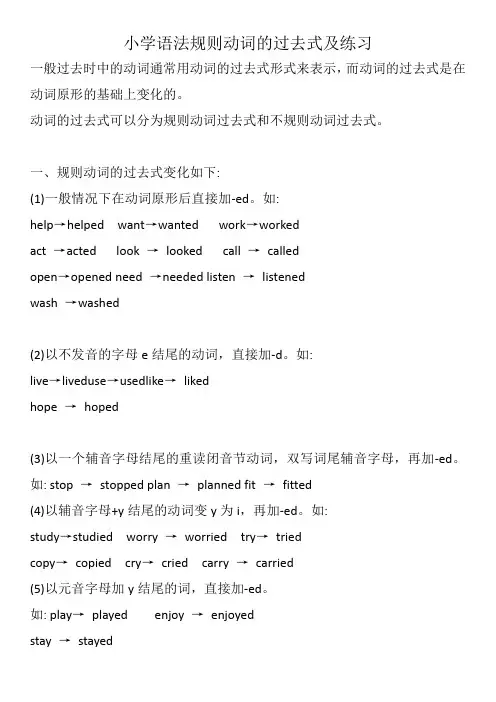
小学语法规则动词的过去式及练习一般过去时中的动词通常用动词的过去式形式来表示,而动词的过去式是在动词原形的基础上变化的。
动词的过去式可以分为规则动词过去式和不规则动词过去式。
一、规则动词的过去式变化如下:(1)一般情况下在动词原形后直接加-ed。
如:help→helped want→wanted work→workedact →acted look →looked call →calledopen→opened need →needed listen →listenedwash →washed(2)以不发音的字母e结尾的动词,直接加-d。
如:live→liveduse→usedlike→likedhope →hoped(3)以一个辅音字母结尾的重读闭音节动词,双写词尾辅音字母,再加-ed。
如: stop →stopped plan →planned fit →fitted(4)以辅音字母+y结尾的动词变y为i,再加-ed。
如:study→studied worry →worried try→triedcopy→copied cry→cried carry →carried(5)以元音字母加y结尾的词,直接加-ed。
如: play→played enjoy →enjoyedstay →stayed二、规则动词过去式的读音也有规律可循。
口诀:清后/t/,元浊/d/, /t//d/之后读/id/。
(1)清辅音/p//k//f/ /s/等后,ed要读/t/。
如:ask→asked /a:skt/cook→cooked /kukt/pass→passed /pa:st/(2)元音或浊辅音/b//g//v//z//m/等后,ed要读/d/。
如:move→moved /mu:vd/live →lived/livd/listen →listened //lisndstay→stayed /steid/(3)/t/或/d/后,ed读/id/。
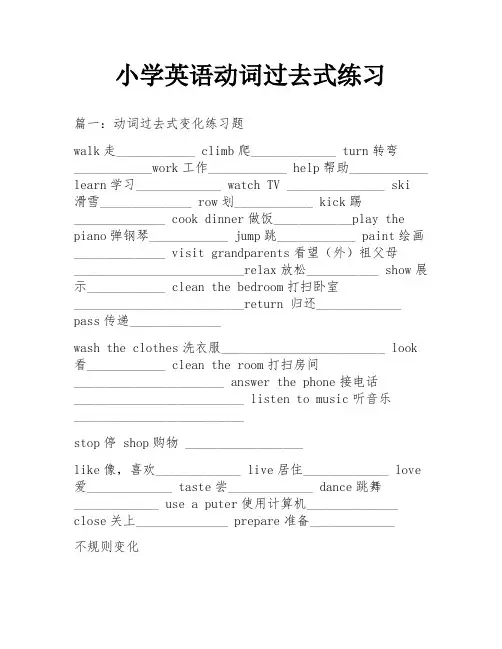
小学英语动词过去式练习篇一:动词过去式变化练习题walk走____________ climb爬_____________ turn转弯____________work工作____________ help帮助____________ learn学习_____________ watch TV _______________ ski滑雪______________ row划____________ kick踢______________ cook dinner做饭____________play the piano弹钢琴____________ jump跳____________ paint绘画______________ visit grandparents看望(外)祖父母__________________________relax放松___________ show展示____________ clean the bedroom打扫卧室__________________________return 归还_____________ pass传递______________wash the clothes洗衣服_________________________ look看____________ clean the room打扫房间_______________________ answer the phone接电话__________________________ listen to music听音乐__________________________stop停 shop购物 __________________like像,喜欢_____________ live居住_____________ love 爱_____________ taste尝_____________ dance跳舞_____________ use a puter使用计算机______________ close关上______________ prepare准备_____________不规则变化eat吃____________ have有;吃 ____________buy买____________ take买;带____________go去____________ sing唱歌____________swim游泳____________ fly飞____________do做____________ make the bed铺床____________ get up 起床____________ leave离开_____________bring带来____________is___________ am___________are____________ see看到_________teach(taught)教 run(ran)跑 fight(fought)打架sweep(swept) the floor扫地swing(swung)荡 sleep(slept)睡觉draw(drew) pictures画画write(wrote) a letter写信 catch(caught)butterflies捉蝴蝶meet(met)见面 meet(met)遇见fall(fell)落下e(came)来drink(drank)喝 tell(told)告诉 find(found)寻找到feel(felt)感觉 drive(drove)驾驶think(thought)思考 ride(rode)骑 wake(woke) up醒来grow种植 grewstand(stood)站立 read books读书__________________ put放__________________set the table摆饭桌__________________ hit (hit)撞击、打 cut 切、割_______empty the trash倒垃圾__________________一、单项选择( ) 1. The girl ____a red sweater is ______duty today.A. in, onB. in, inC. on, inD. on, on( ) 2. It’s very cold, _____your coat, please, Kate. A. put off B. put onC. puts onD. put in( ) 3. —— What day is today? —— It's ______.A. MondayB. a fine dayC. September 1stD. weekday( ) 4. Shall we ______home?A. goB. goingC. goesD. went( ) 5. How much is the hot dog? A. Two B. Three dollarsC. Four hot dogs D. Very much( ) 6. Whose book is it? It’s not ___ book, It’s____A. my ,herB. mine ,hersC. My , hersD.mine,she二、阅读下面短文,选出最佳选项,将其序号填入提前括号内。
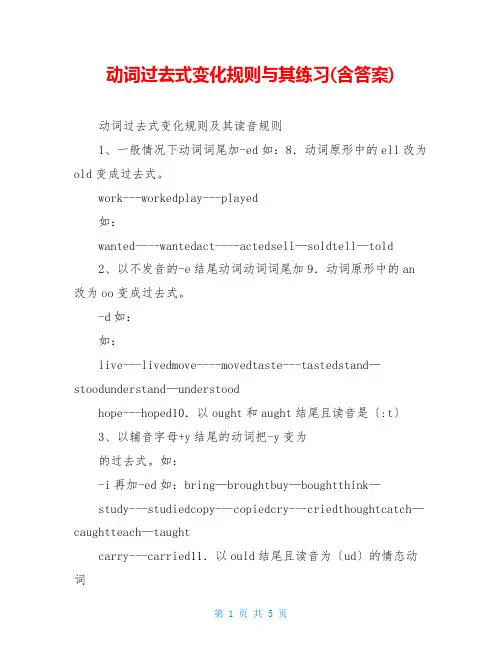
动词过去式变化规则与其练习(含答案)动词过去式变化规则及其读音规则1、一般情况下动词词尾加-ed如:8.动词原形中的ell改为old变成过去式。
work---workedplay---played如:wanted----wantedact----actedsell—soldtell—told2、以不发音的-e结尾动词动词词尾加9.动词原形中的an 改为oo变成过去式。
-d如:如:live---livedmove----movedtaste---tastedstand—stoodunderstand—understoodhope---hoped10.以ought和aught结尾且读音是〔:t〕3、以辅音字母+y结尾的动词把-y变为的过去式。
如:-i再加-ed如:bring—broughtbuy—boughtthink—study---studiedcopy---copiedcry---criedthoughtcatch—caughtteach—taughtcarry---carried11.以ould结尾且读音为〔ud〕的情态动词4、以一个辅音字母结尾的重读闭音节动词过去式。
如:双写词尾辅音字母再加-ed如:can—couldshall—shouldwill—wouldstop---stopped12.把动词原形中的o改为a变成过去式。
5、不规则动词的过去式变化规律性不强如:须多加记忆。
e—camebee—becamego–wentmake–madeget–gotbuy-bought13.在动词原形后加d或t变成过去式并e-camefly-flew且发生音变。
如:不规则动词的过去式的构成hear〔hi〕—heard〔h:d〕say 〔sei〕—said〔sed〕mean〔mi:n〕—meant〔ment〕1.把动词原形中的i 改为a变成过去式。
如:14.动词的过去式与动词原形一样。
如:begin—begandrink—drankgive—gavelet—letmust—mustput—putread—read〔red〕ring—rangsing—sangsit—satswim—swam15.不符合上述规律的动词过去式。
动词过去式变化规则:1. 一般在动词末尾加-ed,如:pull-pulled, cook-cooked2. 结尾是e加d,如:live—lived3. 末尾只有一个元音字母和一个辅音字母的重读闭音节,应双写末尾的辅音字母,再力卩-ed,如:stop-stopped4. 以辅音字母+y”结尾的,变y为i, 再加-ed,如:study-studied cry- cried 不规则动词的变化:1•写出下列动词的过去式is\am ________ fly ________ plant __________ are __________ drink ________ play ______ go _________ make __________ does ________ dance ________ worry ________ ask _______ t aste _______ eat __________ draw ________ put____ pass _ do —2. 用be动词的适当形式填空(过去时填空)1.1 ____ ______ at school just no w.2. He ________ ___ at the camp last week.3. We ___________ students two years ago.4. They _____________ on the farm a mome nt ago.5. Yang Ling _ ___ eleve n years old last year.6. There _______ an apple on the plate yesterday.7. There ___________ s ome milk in the fridge on Sun day.8. The book ______ on the sofa yesterday eve ning3. 选择填空1. Peter _______ in a small house four years ago. Now he ________ in a houseA.live , livesB. lives, livedC.lived, lives2. Amy __________ TV Yesterday.3. Amy is ______ TV Now.4. Amy ____ TV every day.A.watchedB.watchi ngC.watches5. Yesterday we ____________ some books.A.buyB.boughtC.buys6. He _____ a pupil . He ______ a pupil last yearA.wasB. wereC. isD.are7. There _________ a big house many years ago.A.wasB. wereC. isD.are4. 行为动词的过去时练习用行为动词的适当形式填空1. He _______ (live) in Wuxi two years ago.2. The cat _______ (eat) a bird last night.3. We ______ (have) a party last Halloween.4. Nancy _______ (pick) up oranges on the farm last week.5. I _______ (make) a model ship with Mike yesterday.6. They _____ (play) chess in the classroom last PE lesson.7. My mother ____ (cook) a nice food last Spring Festival.8. The girls _____ (sing) and ____ (dance) at the party.。
动词过去式变化规则及其读音规则1、一般情况下,动词词尾加-ed ,如:work ---worked play---played wanted----wanted act----acted2、以不发音的-e 结尾动词,动词词尾加-d,如:live---lived move----moved taste---tasted hope---hoped3、以辅音字母+ y结尾的动词,把-y变为-i 再加-ed,如:study---studied copy---copied cry---cried carry---carried4、以一个辅音字母结尾的重读闭音节动词,双写词尾辅音字母,再加-ed,如:stop ---stopped5、不规则动词的过去式变化规律性不强,须多加记忆。
go –went make –made get –got buy - bought come - came fly-flew不规则动词的过去式的构成1.把动词原形中的i改为a,变成过去式。
如:begin—began,drink—drank,give—gave,ring—rang,sing—sang,sit—sat,swim—swam2.把重读开音节中的i改为o,变成过去式。
如:drive—drove,ride—rode,write—wrote 3.改动词原形中的aw /ow为ew,变成过去式。
如:draw—drew,grow—grew,know—knew,throw—threw(动词show除外,show—showed)4.动词原形中的e改为o,变成过去式。
如:get—got,forget—forgot5.动词原形中的ee改为e,变成过去式。
如:feed—fed,meet—met6.动词原形中的eep改为ept,变成过去式。
如:keep—kept,sleep—slept,sweep—swept 7.动词原形中的eak改为oke,变成过去式。
一.动词过去式归类总结一、动词过去式的规则变化1.一般情况下,动词词尾加 -ed如:work ---worked, play---played, want----wanted, act----acted?2.以不发音的 -e 结尾动词,动词词尾加 -d 把动词原形最后的e去掉,加e/ed如:live---lived, move----moved, like--liked, hope---hoped二、动词过去式的不规则变化1. 把动词原形中的o改为a,变成过去式。
如:become—became, come—came2.把动词原形中的i改为a,变成过去式。
如:begin—began,drink—drank,give—gave,ring—rang,sing—sang,sit—sat,swim—swam 3.把重读开音节中的i改为o,变成过去式。
如:drive—drove,ride—rode,win—won,write—wrote4.动词原形中的e改为o,变成过去式。
如:get—got,forget—forgot5.动词原形中的eep改为ept,变成过去式。
如:keep—kept,sleep—slept,sweep—swept6. 动词原形中的an改为oo,变成过去式。
如:stand—stood,understand—understood7.改动词原形中的aw /ow为ew,变成过去式。
如:draw—drew,grow—grew,know—knew,throw—threw(动词show除外,show—showed)8.动词原形中的eak改为oke,变成过去式。
如:break—broke,speak—spoke9.动词原形中的ell改为old,变成过去式。
如:sell—sold,tell—told10.以ought和aught结尾,且读音是[ :t]的过去式。
如:bring—brought,buy—bought,think—thought,catch—caught,teach—taught 11.以ould结尾且读音为[ud]的情态动词过去式。
动词过去式变化规则及名词练习题一、动词过去式变化规则1. 一般规则:在绝大多数情况下,动词过去式是在动词原形(即动词的基本形式)后面加上"-ed"。
例如:- talk(谈话)→ talked(谈了)- play(玩)→ played(玩了)- walk(走)→ walked(走了)2. 以“e”结尾的动词:当动词以一个静音的"e"结尾时,只需在其后加上一个"d"。
例如:- dance(跳舞)→ danced(跳舞了)- save(保存)→ saved(保存了)- smile(微笑)→ smiled(微笑了)3. 以辅音字母+y结尾的动词:当动词以辅音字母+y结尾时,将"y"改为"i",再加上"-ed"。
例如:- study(研究)→ studied(研究了)- try(尝试)→ tried(尝试了)- carry(携带)→ carried(携带了)二、名词练题请根据给定的单词,写出它们的过去式形式。
1. love → ___________2. watch → ___________3. study → ___________4. stop → ___________5. play → ___________6. wash → ___________7. carry → ___________8. try → ___________请将答案填写在下面的空格中:1. loved2. watched3. studied4. stopped5. played6. washed7. carried8. tried以上是动词过去式变化规则及名词练题的内容。
以上。
动词过去式变化练习题动词过去式变化练习题动词是语言中最基本的词类之一,它用来表示动作、状态或存在的变化。
而动词的过去式变化则是学习英语时不可或缺的一部分。
在这篇文章中,我们将通过一系列练习题来巩固和提高我们对动词过去式变化的理解和应用能力。
练习一:填空题1. I __________ (go) to the park yesterday.2. She __________ (eat) lunch at 12 o'clock.3. They __________ (play) soccer last weekend.4. He __________ (study) for the exam all night.5. We __________ (watch) a movie together last night.练习二:选择题1. Tom ________ (run / ran) in the marathon last month.2. The cat ________ (jump / jumped) onto the table.3. They ________ (visit / visited) their grandparents during the summer vacation.4. She ________ (dance / danced) beautifully at the party.5. We ________ (clean / cleaned) the house yesterday.练习三:改错题1. Yesterday, I goed to the supermarket with my mom.2. He writed a letter to his best friend last night.3. They buyed a new car last week.4. She taked a shower before going to bed.5. We eated dinner at a fancy restaurant.练习四:连词成句1. yesterday / I / to / the / went / beach2. last / they / year / a / bought / new / house3. the / children / played / park / in / yesterday / the4. night / watched / movie / we / a / scary / last5. she / visited / grandparents / her / weekend / last练习五:改写句子1. He played soccer yesterday. (改为否定句)2. We went shopping last weekend. (改为疑问句)3. She studied English for two hours. (改为一般疑问句)4. They watched a movie at the cinema. (改为否定句)5. I ate dinner with my friends. (改为一般疑问句)练习六:完形填空Last summer, my family and I __1__ to the beach for vacation. We __2__ in a cozy cottage near the shore. Every morning, we __3__ up early to watch the sunrise. During the day, we __4__ in the sea and built sandcastles. In the evening, we__5__ seafood at a local restaurant.One day, while we __6__ on the beach, we __7__ a group of dolphins swimming in the distance. It was an __8__ sight! We __9__ our cameras and took many photos. We __10__ the dolphins jumping and playing in the waves.On the last day of our vacation, we __11__ our bags and said goodbye to thecottage. We __12__ the memories we had made during our time at the beach. It was a wonderful trip that we would always __13__.1. (A) went (B) go (C) goes2. (A) stayed (B) stay (C) staying3. (A) wake (B) woke (C) woken4. (A) swim (B) swam (C) swimming5. (A) ate (B) eat (C) eating6. (A) played (B) play (C) playing7. (A) saw (B) see (C) seen8. (A) amazing (B) amazed (C) amaze9. (A) took (B) take (C) taking10. (A) saw (B) see (C) seen11. (A) packed (B) pack (C) packing12. (A) remembered (B) remember (C) remembering13. (A) forget (B) forgot (C) forgotten通过以上一系列练习题,我们可以巩固和提高我们对动词过去式变化的掌握。
小学英语语法动词过去式练习一、写出下列动词的过去式isam_________ fly_______ plant________ are ________drink_________play_______ go________ make ________does_________ dance________worry________ ask _____taste_________ eat__________ draw________put ______ throw________ kick_________ pass_______ do ________二、用be动词的适当形式填空1. I ______ an English teacher now.2. She _______ happy yesterday.3. They _______ glad to see each other last month.4. Helen and Nancy ________ good friends.5. The little dog _____ two years old this year.6. Look, there ________ lots of grapes here.7. There ________ a sign on the chair on Monday..8. Today _____ the second of June. Yesterday ______ the first of June. It _____ Children’s Day. All the students ______ very excited.9. There ________ some milk in the fridge on Sunday.10. The mobile phone _______ on the sofa yesterday evening.三、用行为动词的适当形式填空1.He _____ (live) in Wuxi two years ago.2.The cat ______ (eat) a bird last night.3. We _______ (have) a party last Halloween.4. Nancy ________ (pick) up oranges on the farm last week.5. I ________ (make) a model ship with Mike yesterday.6. They ________ (play) chess in the classroom last PE lesson.7. My mother _______ (cook) a nice food last Spring Festival.8. The girls ________ (sing) and _______ (dance) at the party.9. He ________ (jump) high on last Sports Day.10. She likes ______ newspapers, but she ______ a book yesterday. (read)四、句型转换1. It was exciting.否定句:__________________________________________ 一般疑问句:____________________肯、否定回答:____________________2.All the students were very excited.3.否定句:___________________________一般疑问句:____________________________________________肯、否定回答:__________________________________________3. They were in his pocket. 否定句:___________________________________一般疑问句:____________________________________________肯、否定回答:__________________________________________4. There was a car in front of the house just now.否定句:________________________________________________一般疑问句:____________________________________________肯、否定回答:__________________________________________5. Su Hai took some photos at the Sports day.否定句:________________________________________________一般疑问句:____________________________________________肯、否定回答:__________________________________________6. Nancy went to school early. 否定句:________________________________一般疑问句:____________________________________________肯、否定回答:__________________________________________7. We sang some English songs. 否定句:_______________________________一般疑问句:____________________________________________肯、否定回答:__________________________________________8. They played football in the playground.否定句:________________________________________________一般疑问句:____________________________________________肯、否定回答:__________________________________________一般过去式练习题I. 一般过去时的概念一般过去时表示过去某个时间发生的动作或存在的状态。
动词过去式变化规则:
1.一般在动词末尾加-ed,如:pull-pulled, cook-cooked
2.结尾是e加d,如:live—lived
3.末尾只有一个元音字母和一个辅音字母的重读闭音节,应双写末尾的辅音字母,再加-ed,如:stop-stopped
4.以“辅音字母+y”结尾的,变y为i,再加-ed,如:study-studied cry- cried 不规则动词的变化:
1.写出下列动词的过去式
is\am_________ fly_______ plant________ are ________drink_________ play_______ go________ make _______does_________ dance________ worry________ ask _____taste_________ eat__________ draw________ put _____pass_______ do ________
2.用be动词的适当形式填空(过去时填空)
1. I ____ ___ at school just now.
2. He ____ ____ at the camp last week.
3. We ___ _____ students two years ago.
4. They ____ ____ on the farm a moment ago.
5. Yang Ling ___ _____ eleven years old last year.
6. There ________ an apple on the plate yesterday.
7. There ___ _____ some milk in the fridge on Sunday.
8. The book _______ on the sofa yesterday evening
3.选择填空
1.Peter in a small house four years ago. Now he in a house
A.live,lives
B. lives, lived
C.lived, lives
2.Amy TV Yesterday.
3. Amy is TV Now.
4. Amy TV every day.
A.watched
B.watching
C.watches
5.Yesterday,we some books.
A.buy
B.bought
C.buys
6.He a pupil . He a pupil last year
A.was
B. were
C. is
D.are
7.There a big house many years ago.
A.was
B. were
C. is
D.are
4.行为动词的过去时练习
用行为动词的适当形式填空
1. He _________ (live) in Wuxi two years ago.
2. The cat ________ (eat) a bird last night.
3. We _______ (have) a party last Halloween.
4. Nancy ________ (pick) up oranges on the farm last week.
5. I ________ (make) a model ship with Mike yesterday.
6. They ______ (play) chess in the classroom last PE lesson.
7. My mother _____ (cook) a nice food last Spring Festival.8. The girls ______ (sing) and _____ (dance) at the party.。